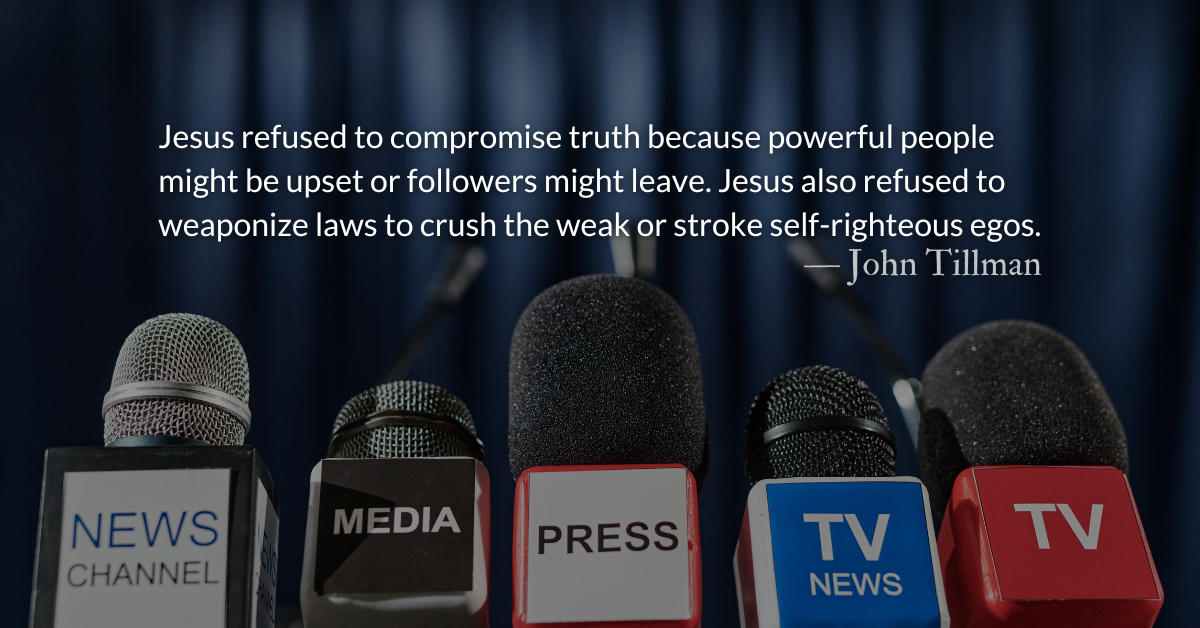Scripture Focus: Mark 10.4-10
4 They said, “Moses permitted a man to write a certificate of divorce and send her away.”
5 “It was because your hearts were hard that Moses wrote you this law,” Jesus replied. 6 “But at the beginning of creation God ‘made them male and female.’ 7 ‘For this reason a man will leave his father and mother and be united to his wife, 8 and the two will become one flesh.’ So they are no longer two, but one flesh. 9 Therefore what God has joined together, let no one separate.”
Reflection: Hot-Button Conundrums
By John Tillman
Like all the religious leaders’ traps, this question posed a theological issue but was really a political maneuver.
Divorce was a hot-button issue because of a controversial national political figure with multiple divorces and sexual scandals. Some Jews loved him. They appreciated him restoring the Temple and wanted him to use Rome’s power to punish their enemies. Other Jews hated him. His gross ineptitude, pride, and lack of morality disgusted them. This ruler also had a violent history which included imprisoning the last prophet who spoke out about his marital controversy and having him beheaded.
In addition to potentially alienating female disciples and supporters, Jesus’ answer to this question could have gotten him killed. “Perhaps,” the leaders must have thought, “Herod will do our dirty work for us.”
Beyond the political, the Pharisees’ question about “lawful” divorce was about the man’s rights. They wanted to know if a man could divorce his wife and “send her away.” What happened to the woman was unimportant.
Their form of patriarchy often considered wives little better than servants or employees to be disposed of without guilt or cause. “Your services are no longer required. Clear out your desk for your replacement.”
Even when they were not trying to get him killed, the religious leaders often hoped Jesus would lose support by choosing a side in their debates. They presented problems that pitted God against Caesar, mercy against justice, and the weak against the strong. Jesus wasn’t having it.
“Give to Caesar what is Caesar’s and to God what is God’s.”
“Let any without sin throw the first stone at her.”
“What God has joined, let no one separate.”
Jesus refused to compromise truth because powerful people might be upset or followers might leave. Jesus also refused to weaponize laws to crush the weak or stroke self-righteous egos.
The right answer to difficult issues is not always in “the middle.” But Jesus stands in the center of God’s will. Stand with him. The right way is not always a “third way” or a fourth or fifth. Jesus’ way is the only way. Follow his way.
Well-meaning people will try to trap us with hot-button issues and conundrums in hopes we will compromise the gospel to be loved by the world or by them. To the best of our ability, let us resist entrapment. Hold both truth and compassion; refuse to compromise either.
Divine Hours Prayer: The Refrain for the Morning Lessons
Mercy and truth have met together; righteousness and peace have kissed each other. — Psalm 85.10
– From The Divine Hours: Prayers for Summertime by Phyllis Tickle.
Today’s Readings
Proverbs 20 (Listen 3:19)
Mark 10 (Listen 6:42)
This Weekend’s Readings
Proverbs 21 (Listen 3:12) Mark 11 (Listen 3:59)
Proverbs 22 (Listen 2:59) Mark 12 (Listen 6:10)
Read more about The Catch All Commandment
Each one acquires as much as he can; the other may fare as best he can. And yet we pretend to be godly…
Read The Bible With Us
When immersed in the Bible, it’s easier to keep from getting lost in cultural storms. Read with us at a sustainable, two-year pace.
https://mailchi.mp/theparkforum/m-f-daily-email-devotional











